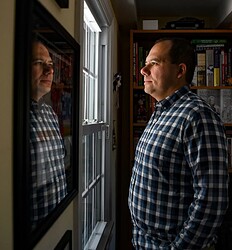senate still has to vote on judges
If I were a Dem Senator I’d be tempted to confirm him, he’d be 80 years old and he’s already melting.
They would do this and he’d live to be 100
Ah well
This guy is the worst.
https://twitter.com/ishapiro/status/1574121092108664842?s=20&t=w6gfdro4AaSVDaSHmXb5CA
I can’t imagine writing a self-serving story that made me look like such an idiot. To start, he doesn’t seem to understand how recruiting works.
It seems that UT Law had botched its dean search the previous year and so was casting I wider net. Would I be interested in applying? (Actually, I think he asked whether I knew anyone who might be interested, but given that Glenn knows more professors than I do—and certainly all of the libertarian/conservative ones—it was clear that he was taking my temperature.)
That parenthetical seems like a really important distinction - he was not in any way targeted for this position!
I put these materials together over the course of a couple of weeks, including a key push at the home of my Louisville law professor friend Luke Milligan, where I spent a week with my sons this past August. (I vividly remember waking up early in his carriage house to articulate my leadership philosophy before getting a start on a day full of speaking engagements and bourbon-drinking.) And I sent them off around Labor Day.
Sounds like an immense amount of effort!
at some point it became clear that I wouldn’t even be invited for a first-round interview.
How shocking, that someone whose only academic experience is a few years as an adjunct professor was not taken seriously as a dean candidate.
I was pissed off. Not because I wouldn’t get to be dean—that was a fun day dream for a while, but I knew that this would be an uphill climb as an unconventional candidate—but because they’d wasted my time.
Very understandable - it sucks to not be considered for a job, especially after working for “a couple of weeks” to get your materials together.
I’d devoted 15-20 hours to this enterprise
Oh
I’m sure he’s not bitter about the person they selected.
The search committee, desperate to get a diversity hire, ended up picking someone who leveraged her offer to get a better one elsewhere.
LOL
This made me lol. I mean does the guy not even know how academia or businesses in general works? You don’t move up into management after a few years at the bottom rungs. All these clowns are the same, blaming their ineptitude on minorities and liberal policy. His poor friend was just asking if a guy conservative circles might know a conservative academic with a pedigree to be a dean and he’s like
Wink, gotcha bro, I’m hearing what you’re saying loud and clear
![]()
This was more depressing than I expected.
This is kind of core LOL LAW here:
“For the bulk of my career,” he said, “I’ve felt I could fairly explain rulings and opinions that I don’t endorse because they rested on coherent and plausible—if to me unconvincing—grounds. In recent years, though, I’ve increasingly struggled to present new holdings as the product of dispassionate legal reasoning rather than personal agendas.”
This is explicitly saying that the job of a law professor is to take rulings and launder them by rejecting political or other agenda-driven explanations and endorsing tortured legal arguments as the “real explanation” instead. You are doing a good job as a professor to the extent that you can convince students of this and he’s annoyed because recent rulings are so mask-off as to make this laundering job impossible.
For the most part, decisions and arguments represent honest interpretation of precedent.

5-4 heads will recognize this one
What of the argument that Rice was represented by ineffective counsel? It’s a powerful one, at least in the eyes of an ordinary person looking at the facts. That doesn’t mean it carries any weight in a legal system set up in so many ways to protect itself.
The Sixth Amendment guarantees defendants the right to counsel. In a 1984 case, Strickland v. Washington , the U.S. Supreme Court took up the question of just how bad lawyers need to be before their performance proves constitutionally defective. Writing for the majority, Justice Sandra Day O’Connor established a two-part test: A lawyer’s performance falls short of the Sixth Amendment’s right to counsel if (a) it is deficient and (b) that deficiency prejudices the defense, depriving the defendant of a fair trial. The opinion went on to define a deficient counsel as one who “made errors so serious that counsel was not functioning as the ‘counsel’ guaranteed the defendant by the Sixth Amendment”—a definition that is not only vague but circular. The inadequacy of the standard has allowed a patchwork of different rules to proliferate across the country. A lawyer can sleep during part of a client’s cross-examination, or be arrested for drunk driving on the way to court, or be mentally unstable, or have been disbarred midway through a trial without sinking to the level of constitutionally defective performance—all of these instances have been adjudicated in various jurisdictions. This spring, the Supreme Court further restricted the right to claim ineffective counsel as the basis for an appeal. Justice Sonia Sotomayor, writing in dissent, declared that the decision “reduces to rubble” a defendant’s Sixth Amendment guarantee. Most of the largest counties across the country have a system like Philadelphia’s, where court-appointed attorneys such as Sandjai Weaver are among the only options for defendants like C. J. Rice.
Justice Thurgood Marshall, the sole dissenter in the Strickland case, faulted the ruling for a “debilitating ambiguity” that compelled judges to rely on “intuitions” about what constitutes ineffective counsel. Under Pennsylvania’s Post Conviction Relief Act, the person whose intuition matters is the original trial judge—this is the person who first considers an appeal. When the matter came before him, Denis Cohen, the judge who had wished Rice good luck, found that Weaver was not deficient counsel. (Through a spokesperson for the Philadelphia courts, Cohen declined to comment, referring to his opinions in Rice’s case.)
The reality is that Commonwealth v. Charles J. Rice represents nothing out of the ordinary. The Conviction Integrity Unit’s caseload captures the situation in a single city, but the same reality exists everywhere. Reforms, even if enacted, would scarcely touch the deeper dysfunction—not just of the criminal-justice system but of neighborhoods and schools. In too many cases, “reform” simply allows dysfunction to remain functional. Rice’s story has produced no bumper stickers or T-shirts or movies. There is no corrupt cop or evil prosecutor. There is only doubtful evidence, deficient counsel, and the relentless grind of the criminal-justice system itself. Rice’s story is meaningful precisely because it is not unusual. Change the details, and it is the story of tens of thousands of poor defendants and the accumulation of large and small injustices that define their lives.
The only unusual thing about Rice’s story is the quirk of fate—his doctor is the father of a journalist—that has gained it any attention at all. To examine his case is to watch a conveyor belt leading in a single direction, with escape routes slamming shut the moment each is glimpsed: a public defender rather than a court-appointed attorney; a routine check of cellphone data; a timely notice of alibi; the right questions put to a dubious eyewitness; a Kloiber instruction by the judge; a request for hospital records; the testimony of an independent medical expert; a defense counsel familiar with the crime scene; a Sixth Amendment that is taken seriously.
Let me state the obvious, in personal terms: With evidence as meager as that against Rice, no prosecutor in the country would even have charged me, a white man with resources. If it had—and if I’d had legal representation worthy of the name—no jury would have brought a conviction.
Legal ethics. This guy warns about a predator gets fined $400k. Church spokesperson says good decision.
What an absolute joke of a profession. The job is literally accessing and navigating corruption on behalf of an assortment of clients, and most of the clients with paying work are rich assholes.
Michael Clayton was a documentary
